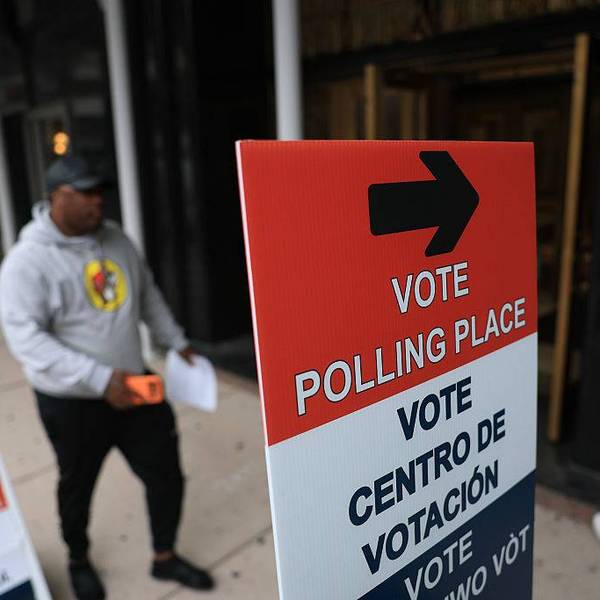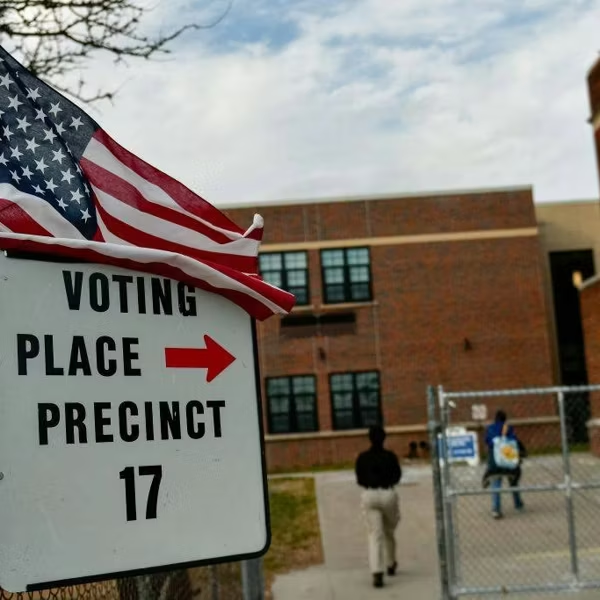Last week I began writing a piece entitled "Dreading Election Day." I decided to stop tormenting myself and so I stopped writing midstream, opting for quiet desperation instead of public dread.
I'm happy to say that some of my worst fears have not come to pass. It does not appear that there has been any major election-related violence at polling places or election offices. The processes of both voting and vote-counting seem to have proceeded smoothly and uneventfully, at least in most places (as I write, Arizona might turn out to be the incendiary exception, courtesy of Kari Lake and Blake Masters).
The main "victory" this week was simply holding back a red wave, not generating a blue one.
Most importantly, there has been no "red wave," and Republicans cannot claim the kind of victory that they expected, and that everyone who cares about democracy--as the Republican party does not-feared.
The Republicans are almost certain to control the House, but by a razor-thin margin that hardly validates their grandiose claims about "retaking America." Indeed, their margin of victory will be one of the smallest in any first-term President's first midterm election, closer to a handful of seats than the thirty or forty or sixty that were predicted to flip. Given expectations, this is almost a victory for Biden and the Democrats, and Biden is not wrong when he says this.
A number of high-profile MAGA candidates, most notably Doug Mastriano and Mehmet Oz, were soundly defeated. Democratic gubernatorial victories in Pennsylvania, Wisconsin, and Michigan mean that those states are well protected in 2024 from the kinds of election denialism that characterized the 2020 Presidential election and that threaten to disrupt both state election results and the Electoral count in 2024. And supporters of reproductive freedom achieved real victories, with referenda passing in Michigan, Montana, California, Vermont, and even Kentucky.
The good news was especially good in Michigan, a key battleground state. Governor Gretchen Whitmer, Attorney General Dana Nessel and Secretary of State Jocelyn Benson all decisively won re-election in races against election deniers. More dramatically, Democrats took control of both the Michigan House and Senate for the first time in decades, and a majority of voters repudiated the Dobbs decision by passing the "Right to Reproductive Freedom Initiative" that will amend the state constitution.
Vox's Zach Beauchamp is right to observe that "The midterms showed American democracy won't go down without a fight."
American democracy was not upended by the election. And supporters of democracy can take heart from their successes in the fight against Republican authoritarianism and election denialism.
But the successes ought not to be exaggerated. American democracy is still under assault, and this week's election results, while not as horrible as many feared, are still in some ways very horrible.
The decisive Gubernatorial victories of Ron DeSantis in Florida and Greg Abbott in Texas keep two seriously reactionary politicians with national ambition in control of two of the largest and most important states in the country. Kari Lake remains in contention in Arizona, where the votes are still being counted, and it is likely that she will wage a "Stop the Steal" campaign if Democrat Katie Hobbs is declared the winner.
Control of the Senate remains uncertain. But the victories of J.D. Vance in Ohio and Ron Johnson in Wisconsin--Trumpist extremists running against excellent young Democratic candidates who ran strong campaigns--are hardly cause for rejoicing. And the fact that the absurdly unqualified Hershel Walker received almost 49% of Georgia's votes, forcing Raphael Warnock into a December run-off election, is hardly a good sign. But with Arizona's Mark Kelly, Nevada's Catherine Cortez Masto, and Warnock all still in the running--with Kelly in a strong position- it still remains possible that Democrats will retain control of the Senate, the most important consequence of which would be control of Senate committees.
But it is the virtually certain Republican conquest of the House of Representatives, however slim the margin of victory, that truly endangers democracy moving forward. As the New York Times reports, at least 140 of the roughly 220 Republicans elected to the House--roughly 2/3 of the caucus--are election deniers. Every single House Republican who stood up to Trump after the January 6 insurrection is gone, while almost every single House Republican who voted on January 6, 2021 against the validation of the Electoral College count, will return. And the current Republican caucus promises to be even "more extreme" than its predecessor. One sign: Trump acolyte Kevin McCarthy's Speaker of the House bid is being challenged from the right.
Commentators who wonder how a divided government might get anything done are living in a dream world. As former-Republican Congressman David Jolly has said repeatedly on MSNBC, the Senate and especially the House Republicans will have no interest in governing. Their goal will be simple: to undermine, obstruct, embarrass, and weaken the Biden administration and the Democratic party, to distract from the real issues facing the country--for which they have proposed no solutions--and to destroy the Biden presidency.
The Hill and The Post recently reported that House Republicans plan at least five investigations-of Hunter Biden's business activities, the alleged politicization of the Justice Department under Merrick Garland, COVID-19's origins and the mitigation policies of the despised Anthony Fauci, the Afghanistan withdrawal, and Homeland Security's handling of the U.S.-Mexico border under Alejandro Mayorkas.
House Republicans will shut down and delegitimize the January 6 Committee--indeed it would not be surprising if they even sought to destroy the Committee's work-product-and do everything possible to obstruct any Justice Department prosecutions of Trump and those close to him. As Walter Shapiro put it, the midterms were "all about" one question: "Impeach Biden or investigate Trump?" The almost certain Republican conquest of the House loudly proclaims the answer.
Barton Gellman is the terrific writer for The Atlantic who brilliantly and presciently forecasted the January 6 coup attempt before the 2020 election took place in "The Election That Could Break America." Last month he published a new piece: "The impeachment of Joe Biden." His words there ought to be treated with utter seriousness: "Sometime next year, after an interval of performative investigations, Republicans in the House are going to impeach Joe Biden. This may not be their present plan, but they will work themselves up to it by degrees. The pressure from the MAGA base will build. A triggering event will burst all restraints. Eventually, Republicans will leave themselves little choice."
Can Biden be removed from office via impeachment? Not as long as the Senate is even close to evenly split. But can Biden be savaged by an impeachment, weakening the prospects for Democratic victories in 2024, while simultaneously mobilizing the MAGA mob to new heights of fury? Absolutely. As David Corn put it Mother Jones: "The Party of January 6 Appears to Have Taken The House. Prepare for the Crazy."
What I've just described might be considered "high culture" Republicanism, assaults on liberal democracy that go through the motions of legislative authority and Constitutional procedure.
I have not yet even mentioned the man who still mesmerizes and mobilizes Republican base voters, and who still stands as the leader of the reactionary MAGA movement: Trump himself.
Trump is above all a narcissistic sociopath for whom politics is an arena of domination, humiliation, and vengeance. He hates Biden, he hates Pelosi, he hates liberalism and he hates democracy, and he will revel in the House Republican politics of torment and do his part to foment anger (soon perhaps via a return to Twitter)--and we must not forget that there is much violent anger on the Republican right, even if it did not rear its ugly head on Election Day. McConnell and McCarthy will do nothing to stand in Trump's way, out of spinelessness and lack of principle. Trump may face challenges from Ron DeSantis or Mike Pence. But the latter has no chance of succeeding, and the former can succeed--by proving himself to be a new and improved Tribune of Republican Reaction. Trumpism without Trump or Trumpism with Trump. Either way, liberal democracy loses.
The kinds of political reforms advanced just a short time ago by Democrats- the For the People Act, the John Lewis Voting Rights Enhancement Act, the tamer Freedom to Vote Act, and the even tamer Electoral Count Reform Act--these things are entirely off the political agenda. Climate change, economic insecurity, the widespread breakdown of trust to which crime and criminal injustice is connected--so long as Republicans can obstruct, there will be no legislation to address these things through meaningful public policy. And Republicans in control of the House will be able to obstruct with a vengeance.
Things will continue to fall apart, economic problems will get worse, political institutions will continue to decay and asymmetrically polarize, popular resentments will fester . . . and democracy will continue to falter.
Don't get me wrong. There were real victories this week, and each of them ought to be prized, learned from, built upon.
And it is good that voters did not elect more MAGA extremists, and some real chinks in Republican armor were exposed. It is good that some small fissures have opened upon among Republicans, and that the Trump-DeSantis hostility will intensify--though the effort of two demagogic extremists to one-up each other can also easily intensify the neo-fascist tendencies among the MAGA base. It is also good that President Biden can credibly give excellent speeches highlighting real Democratic accomplishments. And Congressional Democrats can draw upon a range of legislative tactics to expose disastrous Republican maneuvers and to try keep public attention on important issues--as even the notorious Alexandria Ocasio-Cortez has pointed out in a terrific new interview with the Intercept's Ryan Grim.
But the main "victory" this week was simply holding back a red wave, not generating a blue one. It's good that Democrats did not lose as badly as feared. But they still lost in crucial ways. And while a stronger Republican showing would surely have enabled more awfulness, the conquest of the House is more than sufficient to prosecute a civil war about Democrats and "CRT" and "woke culture" and "crime" and "border control" and against liberal democracy itself.
Things are not as dark as they might have been. It always makes sense to prize glimmers of light, and it also makes sense for political leaders to exaggerate their importance. It is fine for democrats and Democrats to feel a sense of relief. It is fine for President Biden and Democratic operatives to claim credit for staving off disaster. But the bottom line is that American democracy is still in danger. There is an overused sports trope: that when it comes to decisive games, "there are no moral victories," there is only winning and losing, and losing small rather than big is still losing.
Back on November 4 of 2020--two days after the election--I published a piece predicting that Trump would refuse to step down, and that we would be lucky if Biden actually was declared President-elect and inaugurated as President. I noted that even that scenario would be "pretty bad" even if not the worst possible: "For there was no 'blue wave' analogous to 2018 in Congressional elections. . . . More importantly: whether or not Trump winds up actually "winning," Trumpism is alive and well. Our best case scenario is one where there likely remains divided government and Republican legislative and judicial obstructionism and a continuing reservoir of racism and resentment that can easily power Republican gains in 2022 and 2024."
That was then. Biden was inaugurated, the Democrats retained narrow control of the House, and even won the Georgia runoff elections that gave them 50 Senate seats. And Biden did some real good and the most important Democratic policy proposals were scuttled or weakened and . . . next year the Republicans will control the House, and the despicable Jim Jordan will chair the House Judiciary Committee unless he is elevated over McCarthy to the Speaker position. And Trumpism is alive and well. And Republicans are likely to retain control of at least 17 state governments, where they will reinforce legislation that restricts voting and subjects election counting to partisan influence. And a very conservative 6-3 Supreme Court Republican-appointed majority will continue to strike down important gains of the last 50 years. And continued Republican obstructionism in Congress, and the continuing reservoir of racism and resentment that powered Republican gains this week, can easily power Republican gains in 2024.
There will be no apocalypse in January, 2023. But this was always known. All the same, this week's election exposes the precariousness of America's democratic institutions and the continued power of the MAGA Republican party to further undermine them.
Some disasters have been averted. But the danger, to democracy and to public decency, remains.




